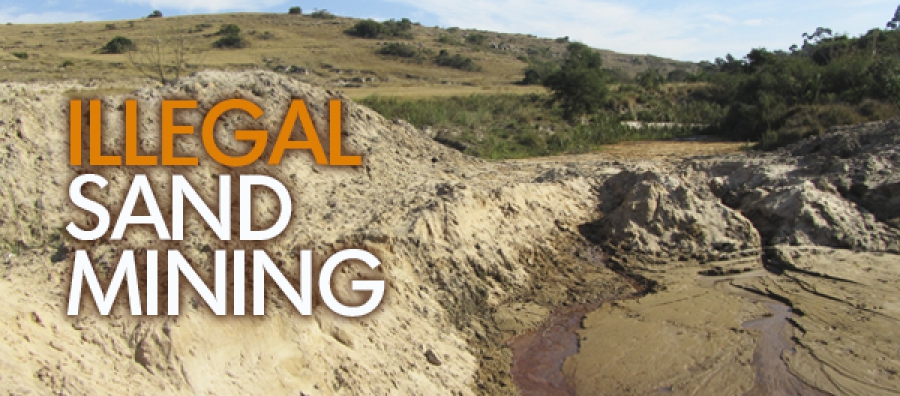MACHAKOS. By Shadrack Kavilu. Every day dozens of trucks roar into Kalingile village in southwest Kenya and moments later speed off down a dirt road laden with tonnes of sand ready to supply to construction markets, leaving acres of destroyed farmland in their wake.
As Kenya’s booming construction industry has seen demand for sand soar to record levels, it has put pressure on agricultural land and other sources of sand nationwide, prompting sand harvesters to invade farms for the rare commodity, studies show.
Years of uncontrolled sand mining in riverbeds at a rate that outpaces natural replenishment have depleted sand deposits in the rivers of counties surrounding the capital, Nairobi.
The scarcity has left sand miners with no option but to dredge for sand on farmland, an illegal business that has fuelled the construction industry but threatens the livelihoods of thousands of small-scale farmers whose land it destroys.
Kalingile village, in Mavoko constituency, 47 km (26 miles) east of Nairobi, is among many areas of Kenya that have been targeted by sand harvesters. The illegal activity has left hundreds of farmers scraping a living from tiny parcels of land.
Stephen Mulinge, a farmer who now works an acre of land in the area, said he had lost four acres to sand miners who left his land barren after invading his farm under cover of darkness.
“When I refused to let them mine sand on my farm, they came at night, dredged and loaded to trucks,” Mulinge, 42, told the Thomson Reuters Foundation.
He said illegal sand harvesting in the area had led to the destruction of vegetation, reduced fertile land and farm productivity and exposed the community to food insecurity.
“Out of my five-acre farm, only an acre is under production the rest has been turned to pits and trenches and can’t be put to agricultural use,” Mulinge said.
The area is especially vulnerable to illegal sand mining because it is near markets and located on a transport route that makes it cheap to move sand from the area, he said.
As demand for sand continues to soar, the community fears the extraction of sand on their farms is not about to end soon, despite the enactment of the Machakos County Sand Harvesting Act in 2014, which sought to regulate the harvesting of sand.
ILLEGAL SAND SITES
According to the National Environment Management Authority (NEMA), recent legislation on sand mining at the national and county levels have helped to regulate the industry.
“We have issued restoration orders in several illegal sand sites and summoned some of the culprits to our offices,” Titus Simiyu, NEMA Machakos County Director for Environment, said.
“The authority has to conduct environmental impact assessment report before awarding a licence to sand harvesters.”
Simiyu added that new national guidelines in 2007 had also helped to regulate uncontrolled sand mining across Kenya.
“It’s unfortunate that some of these sand dealers are engaged in illegal sand harvesting despite the many awareness campaigns we have conducted in the area,” Simiyu said.
However, despite new laws that are supposed to ensure sand is harvested and used sustainably, illegal sand mining has gone on unabated in Machakos, said Mulinge.
“There is nothing we can do; we have complained to authorities without much help. Some of these cartels are so powerful and crooked they will use whatever means to get sand with or without our consent,” Mulinge said.
The law restricts sand mining between 6am and 6pm, but farmers said illegal miners avoid arrest by harvesting at night.
The Act states: “On-farm sand harvesting shall only be undertaken by open-cast harvesting method and no underground tunneling or extraction of sand shall be undertaken.”
POVERTY
While most local farmers say sand extraction harms their livelihoods, land owner Kevin Mboya is making money from it.
“I have no problem with sand miners as long as they pay for the sand before harvesting it,” Mboya said.
Mboya, who owns eight acres of land, said that as erratic weather patterns have made it harder to rely on farming that depends on rainfall, sand harvesting has brought a new income.
“If I can fetch around $15 per every truck loaded with sand, this is better business than having to wait for rains that you are not sure will come,” he said.
High rates of poverty in the area have led most of the farmers to hand over their farms for sand harvesting.
“With these high levels of poverty and uncertain weather conditions we don’t see extraction of sand on farms coming to an end any time soon,” Mboya said.
Even though extraction is rendering agricultural land barren, some sand harvesters insist they always get prior permission from the land owners.
“We have always sought consent from land owners. The deals are done above board and with due process. This is like any other business where willing seller meets willing buyer,” said Eric Mutisya, a sand miner who has pitched tent in the area.
However, he says that in some cases mining takes place without the owner’s consent especially if he is not at the farm.
“These are isolated cases carried out by rogue harvesters who are in a hurry to make a killing. They scoop sand anticipating paying the owner at a later date,” he said. (Reporting by Shadrack Kavilu; Editing by Jo Griffin.; Please credit the Thomson Reuters Foundation, the charitable arm of Thomson Reuters, that covers humanitarian news, women’s rights, trafficking, property rights and climate change. Visit news.trust.org)

Leave a Reply